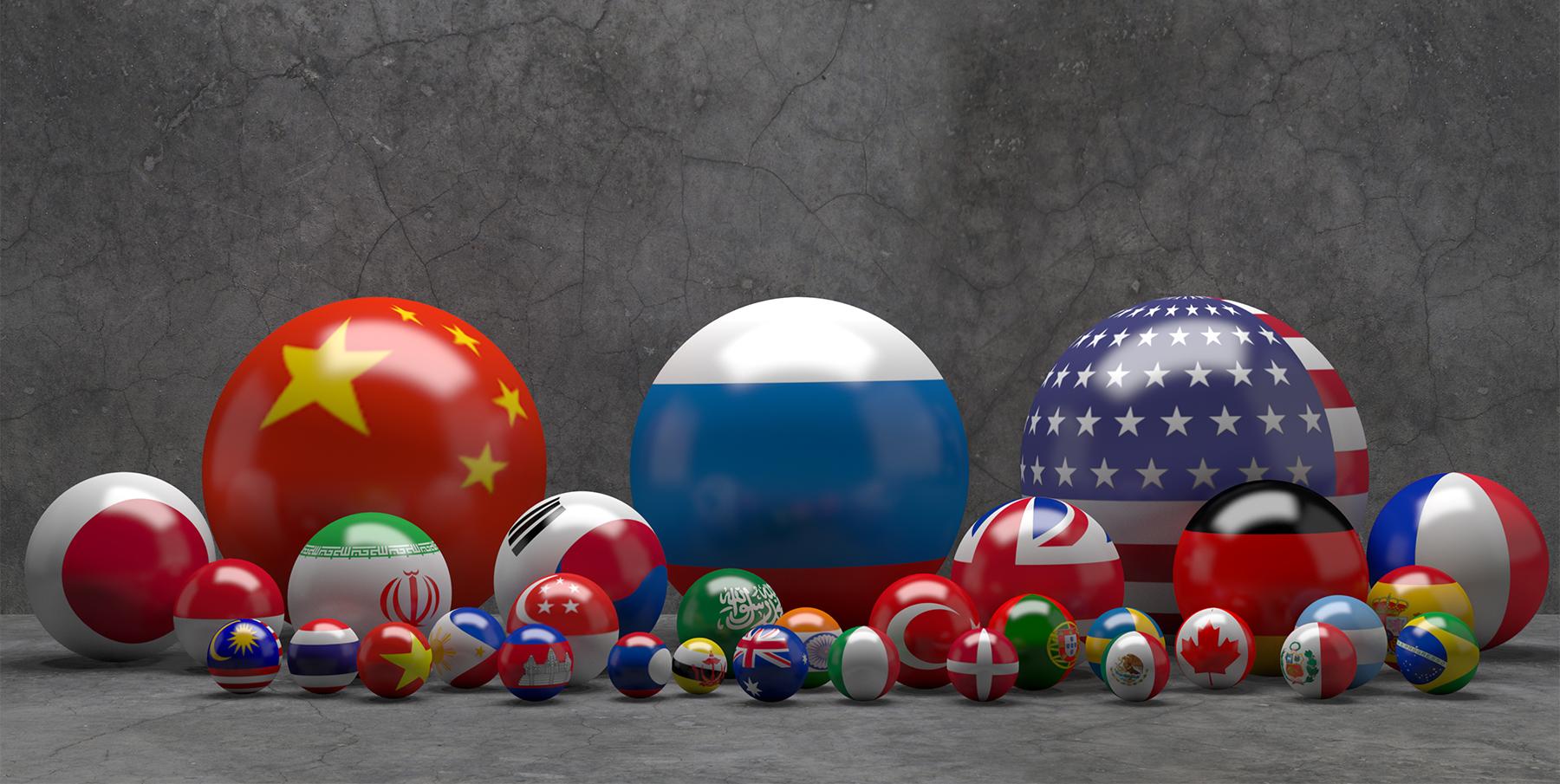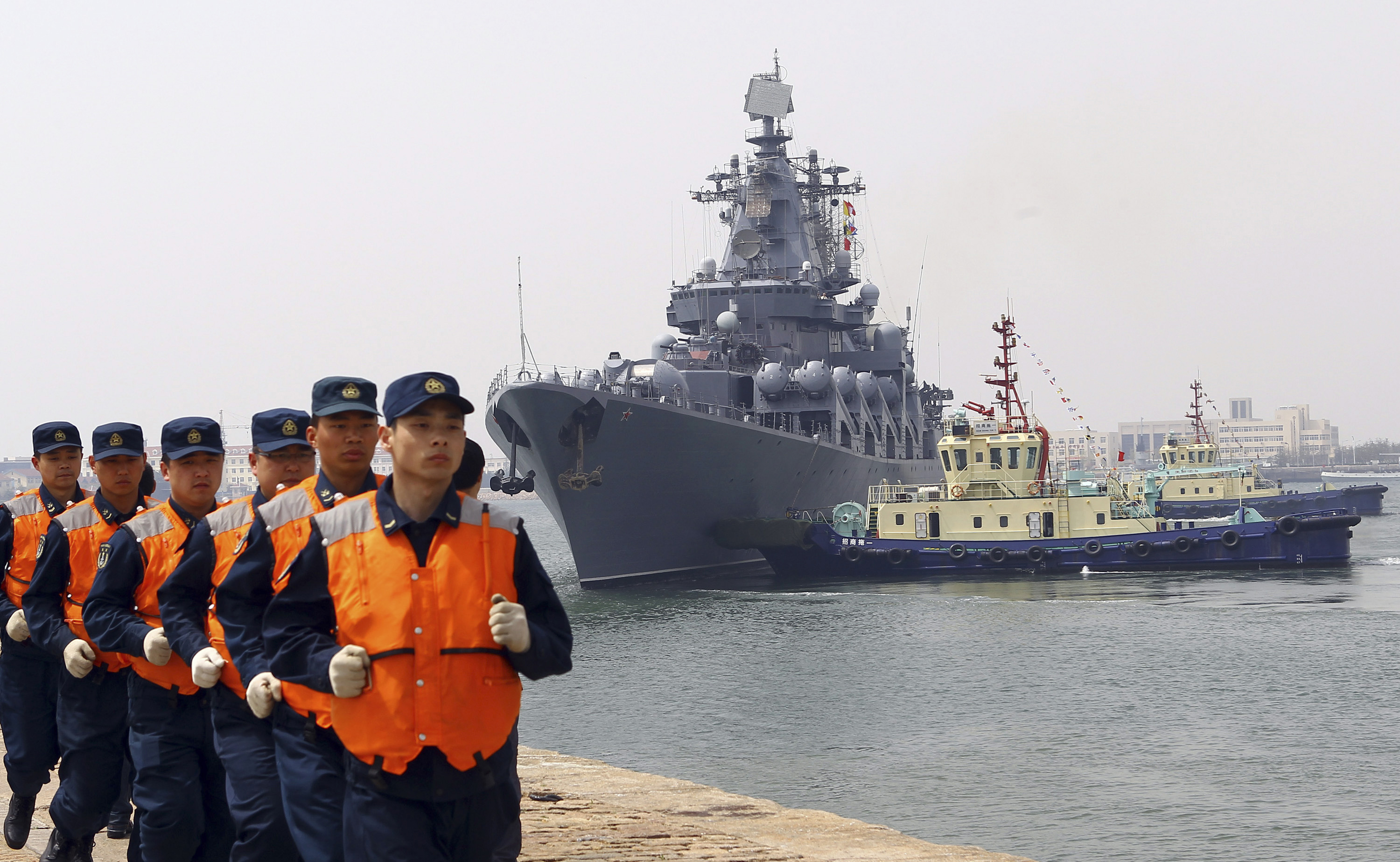Politics is combat. International politics is international combat. By the “suicide” of the Soviet Union (that post-mortem verdict was Fidel Castro’s), the Empire was unbound and it is now threatening world peace and the future of humanity itself. Every single arms control agreement (bar one) has been unilaterally renounced, but before that came the rollback of the Yalta and Potsdam agreements with the destruction of former Yugoslavia and the expansion of NATO. Now the empire seeks to dominate the entire global theatre in all possible spheres. This should not come as a shock or surprise. It is almost a law of physics (perhaps it should be called ‘geophysics’) that once unwisely unbound, the Empire would uncoil, spread, expand, and seek to dominate—in short, that the Empire would seek to behave as an empire.
The geohistorical question facing humanity today is how to constrain the Empire, but not return to the old delusions of how to do so. The Empire must be initially counterbalanced and then constrained-- bound-- permanently, until, as in the case of the Roman Empire, there is a benign change of beliefs (in this case, political) from within its own society, its own citizenry and not as before, a change in its external posture which proves in the long geo-historical term, to have been merely ephemeral, conjunctural, even tactical.
The Empire’s strategy as concerns Russia is quite simple to understand. It is a re-run of the strategy that enabled them to prevail in the Cold War. It is to provoke Russia into an arms race and exceed prudent spending limits, cause economic hardship and generate enough discontent that the citizenry, especially the young, will agitate, thereby causing psychological exhaustion and catalyzing peaceful democratic “regime change”, bringing into office a capitulationist/collaborationist administration sooner or later, in the wake of the end of President Putin’s term. Meanwhile, what is being played out in Hong Kong foreshadows the geohistorical endgame envisaged by the Empire for China and Eurasia as a whole.
Since neither Russia nor China can countervail the US-led Western alliance on its own, a closer equation is needed between the two than between either Russia or China and any other big power or powers. No other big power, however friendly, is the target of unremitting and adversarial Western action, and therefore will not take the same risks for either Russia or China as each of them should logically do for each other, since they both stand threatened and targeted. A Concert of Big Powers cannot be a substitute for a defensive United Front or coalition of states, of which the Russia-China relationship will be the main alliance, consisting of those sovereign states actively threatened in a military-economic sense by the West.
Each of us has his own definition of “geo-history”, and mine is the interface of the “geopolitical” and the “world-historical.”
We are marked by two anniversaries, that of the start of WW II in 1939 and its end in 1945. Fascism was a unique regime of terror, with a strategy of unbridled ‘exterminism’ and therefore constituted a unique political evil in world history. However, outside of its type of regime, strategy and tactics, was its ‘grand strategic’ goal also unique or was it not? Is there a resemblance or homology between, on the one hand, the doctrine of Ein Reich, the telos of world domination, a Thousand Year Reich, and the military moves of Germany and its Axis partners in the run-up to WWII, and on the other, that of a unipolar world order and global military expansionism; of open-ended unipolar global leadership? Is there a continuity or homology between on the one hand, the wartime US Grand Area planning for the postwar world (the documents of which were unearthed by Noam Chomsky), and the present Indo-Pacific strategy and on the other hand, the notorious earlier search for Lebensraum? Is the Indo-Pacific strategy an insistence on “maritime Lebensraum”?
If the answer is yes, and the two paradigms can be superimposed upon each other, then history provides only one answer: the united front and its extension, a global grand alliance. But a united front and grand alliance with whom, to what end?
Politics is combat. International politics is international combat. By the “suicide” of the Soviet Union (that post-mortem verdict was Fidel Castro’s), the Empire was unbound and it is now threatening world peace and the future of humanity itself. Every single arms control agreement (bar one) has been unilaterally renounced, but before that came the rollback of the Yalta and Potsdam agreements with the destruction of former Yugoslavia and the expansion of NATO. Now the empire seeks to dominate the entire global theatre in all possible spheres. This should not come as a shock or surprise. It is almost a law of physics (perhaps it should be called ‘geophysics’) that once unwisely unbound, the Empire would uncoil, spread, expand, and seek to dominate—in short, that the Empire would seek to behave as an empire.
The geohistorical question facing humanity today is how to constrain the Empire, but not return to the old delusions of how to do so. The Empire must be initially counterbalanced and then constrained-- bound-- permanently, until, as in the case of the Roman Empire, there is a benign change of beliefs (in this case, political) from within its own society, its own citizenry and not as before, a change in its external posture which proves in the long geo-historical term, to have been merely ephemeral, conjunctural, even tactical.
The Empire’s strategy as concerns Russia is quite simple to understand. It is a re-run of the strategy that enabled them to prevail in the Cold War. It is to provoke Russia into an arms race and exceed prudent spending limits, cause economic hardship and generate enough discontent that the citizenry, especially the young, will agitate, thereby causing psychological exhaustion and catalyzing peaceful democratic “regime change”, bringing into office a capitulationist/collaborationist administration sooner or later, in the wake of the end of President Putin’s term. Meanwhile, what is being played out in Hong Kong foreshadows the geohistorical endgame envisaged by the Empire for China and Eurasia as a whole.
By its global offensive, imperialism has potentially overstretched itself morally, ethically and politically. Not since Vietnam has imperialism had a potential target profile which is so large and so exposed. The targeting of Iran when that country has not violated the JCPOA can be turned into a massive indictment on the twin grounds of reason and logic as well as of natural justice. Similarly, the targeting of Venezuela can be exposed for the absurdity that someone who did not even run for Presidential office should be recognized as the legitimate President of a country. So also, the unilateral withdrawal from arms control agreements can be exposed for the danger this poses to humanity.
One of the most important principles of asymmetric political resistance is the identification of the most important strategic real estate as the moral high ground. The moral or moral-ethical high ground is the seizure and occupation of that terrain of argument which is recognized and recognizable as more rational, reasonable and of broader benefit to humanity, assuring “the greatest good of the greatest number” according to universal values and norms and not merely national or regional values and norms.
The main axial routes and themes of the political struggle should be Peace and Sovereignty. Firstly, these are themes that have a universal or near-universal resonance. Secondly, they allow the critic to fight for and occupy the moral high ground because the West has only a toehold on the moral high ground in all these cases. Thirdly, they are also the main achievements of humanity that are threatened by the Western offensive. Fourthly, they are themes that are likely to have resonance among peoples the world over, albeit with greater or lesser emphasis in different areas of the globe.
This great struggle cannot be waged with the guiding ideology solely of or governed solely by “State Interest” or “National Interest.” It can only be waged by the recovery of the spirit of “internationalism” that was present in the entire Soviet period. It is little appreciated that Stalin, the father of ‘Socialism in One Country,’ and political leader of the Great Patriotic War waged an international campaign against fascism. Even in periods of isolation and siege, Stalin’s perspectival approach was never one of a cultural or civilizational preoccupation. The struggle for Peace and Sovereignty, Against Interventionism and Global War, requires the building of global opinion and a global movement.
A contemporary Realist would immediately grasp the opportunity which has opened up in post-Cold War history, namely of compensating at least partially for the loss of those territories and Russia’s Western buffer, the rollback of Yalta and Potsdam and the USSR’s wartime gains and the advance of the NATO borders up to Russia, by the geostrategic gains on the Eastern front through the renewal of partnership with China. Obviously, this has been recognized and acted upon but it has yet to be optimized by the kind of diverse yet solid strategic relationships that the USA has through NATO in the West, and Japan and many other states in other parts of the world. A Realist would recommend a re-visiting, retrieval and revision of Article 1 of the 30 Treaty signed by Stalin and Mao, which recognizes that the security of Russia and China are indivisible and that any aggression against one will be regarded as aggression against the other and responded to accordingly.
There is a contradiction between the Western project of the encirclement of Russia and the intellectual response to that encirclement. One of the reasons for that contradiction is the fact that academies and think tanks have been shaped and formed by and sometimes in the decades of ‘peaceful coexistence’ and later ‘détente’ with the West and are almost structurally unprepared for the change in the global geopolitical-geostrategic ‘ecology’ as it were. These institutions were formed or reshaped by party edict as adjuncts of the tasks of negotiation with the West and the competition (which became enmity for a period) with China. They are structurally oriented towards the West; their institutional faces are turned westwards. Their entire spirit and ethos are those of partnership with the West and suspicion of China stemming from the 1960s and 1970s.
Institutions need to reflect the tasks of the new times, those of facing the West as an adversary in a protracted Cold War encompassing a global hybrid war; facing encirclement by the West and the global offensive of the West. Perhaps new joint analytical and academic institutions should evolve as intellectual-scientific superstructures of the SCO, BRICS, the Astana process and most importantly the partnership with China. A Russo-Sino joint think-tank or ensemble of think-tanks of Advanced Studies, as an intellectual microcosm or advanced prototype of a strategic alliance (not merely a strategic partnership) seems an imperative need.
The threat to Russia is nothing less than deeply, profoundly existential. If Iran is disaggregated by military action two things will result simultaneously. In a small scale equivalent of the collapse of the USSR and the dawning of the unipolar moment after the Cold War ended, there will be a dramatic shift of the balance of forces within the global Islamic community or ummah, to the Wahhabi/Salafists, just as in return to pre-1979, Western power is projected right back into an arena dangerously proximate to Russia’s ‘soft underbelly’ as the western analysts have always seen it. The intermediate ‘buffer state’ may not always remain so. Any deep damaging of Iran will also have global grand strategic implications of tightening the encirclement of Eurasia and weakening China.
Iran’s capacity for deterrence and if deterrence fails, its capacity for prolonged resistance and the same of Venezuela, will decide the level of resistance far away from Russia’s frontlines. If Afghanistan ended the USSR by bleeding it white, then the most effective Western policy in that theatre was to equip the so-called mujahidin with shoulder fired anti-aircraft missiles to neutralize Soviet air power. If the USSR had not been so enmeshed in détente as to hold back the SAM-6s from and provide only a minimum supply of SAM-7s to the Vietnamese, then the damage inflicted on the US may have been such that it could not have gone on the offensive in Afghanistan a mere three years after the withdrawal from Saigon. While the US had no compunction in providing shoulder-fired to the Afghan mujahidin, with whom they had nothing in common ideologically, knowing full well that they would cause Soviet casualties especially among pilots, the USSR did have compunctions in providing SAM-6 batteries and a far more generous quantity of SAM-7s to the Vietnamese who were ideological comrades. The Vietnamese used to wryly remark to those of us in the Vietnam solidarity movement in Asia, that had the USSR provided them with the quantity and quality of air defense missiles that it gave the Arab states in the same period, the early 1970s, the Vietnamese would certainly have used them more effectively and with less losses than did the Arab armies.
That is perhaps the best single piece of explanatory evidence as to why the US recovered so fast from the Vietnam defeat while the USSR unilaterally withdrew from the Cold War and collapsed. It was a matter of will, and the consistent clarity of the US that the USSR was the enemy, and the determination to prevail over it. Later, the successor state of the USSR, the Russian state, with the Russian armed forces as its core, was seen as the enemy—even when the Russian administration and leadership may have been seen as a useful quasi-ally, partner and even ‘friend.’ Thus, on the questions of Iran and Venezuela, a contemporary Russian ‘dialectical and historical Realist’ analysis would consider a ‘reverse Brzezinski.’
China appears caught in a contradiction within an irony. The contradiction is that having entered the world capitalist order dominated by the West and become a major player within it, it now finds itself vulnerable to both economic and military threats simply because it proved to be strong enough to be an economic competitor but not strong enough to prevent, deter or prevail over a military build-up triggered by the inherently hierarchical and hegemonistic character of the system it had bought into. The irony is that China had found itself caught in a contradiction because it had forgotten Mao’s theory of contradictions which draws a fundamental distinction between antagonistic and non-antagonistic contradictions. China regarded the competition between itself and the West as a purely economic and therefore non-antagonistic contradiction, but the world system being not only an economic system but one of power, China’s peaceful rise was perceived by the West not as a ‘friendly’ or non-antagonistic contradiction but precisely as an antagonistic one, to be responded to not merely by economic means but also by military means, namely the biggest build-up of an armada in recent history through the Indo-Pacific strategy.
The irony is a dual one, because it was China that first cautioned the USSR about the idealistic and utopian nature of the project of “peaceful economic competition” with the West, but later pursued it with greater zeal and success than the USSR ever did or could. In the 1960s and 1970s, China had established a methodology of identifying the contradictions in the world at any given period and went on to hierarchize those contradictions. The listing would naturally shift over time and became irrationally anti-Soviet at one point; an irrationality that lasted a long period. However, the methodology of discerning, identifying and ranking contradictions was a realistic one, because it alerted China or anyone who used the dialectical framework, to the reality of antagonism, of hostility, in the world arena.
If the world’s foremost military power which disposes of the greatest destructive force known by history, regards one or more countries as adversaries, indeed as The Other(s), and backs up this policy perspective with the actual offensive disposition and concentration of men and material over time, then basic survival instinct should dictate that the states designated and treated as adversaries should seek to combine their military and non-military strengths to countervail and deter such a power which regards them with hostility and as threats. There are several such countries but only two such great powers, and these are Russia and China, in whichever order. Those who opine that Russia can slip out of this siege by living down a perception of a special relationship with China and associating as closely or even more closely with other great or big powers, seem to forget that Western moves against Russia’s interests preceded its renewed hostility to China.
The bottom line is that in any objective, dialectical and historical Realist analysis of Russia’s core interests, no relationship with Europe can be a substitute or even on par with a partnership with China. Not all vectors are equal, and some are certainly more equal than others.
Since neither Russia nor China can countervail the US-led Western alliance on its own, a closer equation is needed between the two than between either Russia or China and any other big power or powers. No other big power, however friendly, is the target of unremitting and adversarial Western action, and therefore will not take the same risks for either Russia or China as each of them should logically do for each other, since they both stand threatened and targeted. A Concert of Big Powers cannot be a substitute for a defensive United Front or coalition of states, of which the Russia-China relationship will be the main alliance, consisting of those sovereign states actively threatened in a military-economic sense by the West.
These are the strictly personal views of the author.









